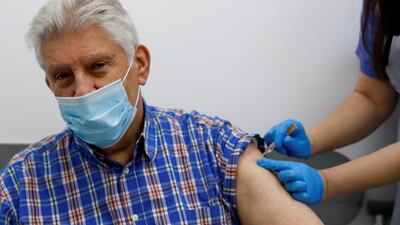The British government on Sunday denied criticism that it was too slow to impose travel restrictions on India as a coronavirus variant identified in the subcontinent spreads in the UK.
England, Scotland and Wales will unlock parts of their economy on Monday but future plans for reopening have been put in doubt by the more transmissible variant.
It was "completely wrong" to suggest the UK could have acted faster to designate India as a red list country, meaning arriving travellers would have to enter quarantine in hotels, Health Secretary Matt Hancock told Sky News.
Mr Hancock said India was placed under the strict travel restrictions in April before the variant, known as B16172, was under investigation.
The British government has come under criticism from opposition politicians over its decision to put Pakistan and Bangladesh on its red list before India.
Mr Hancock denied that the decision was influenced by a planned trip by Prime Minister Boris Johnson in April for post-Brexit trade talks.
"We take these decisions based on the evidence," he said of the visit, which was eventually scrapped because of surging Covid-19 cases in India.
Indoor hospitality and entertainment venues such as cinemas, museums and sports areas will open their doors in most parts of the UK for the first time in months on Monday.
People and families will be able to meet with some restrictions in private houses under the new measures.
Mr Hancock said the reopening could go ahead despite 1,300 cases of the Indian variant in the UK because of the country's successful vaccination campaign and close monitoring of cases.
But he sounded a note of caution over plans to completely lift restrictions on June 21.
"We're in a race between the vaccination programme and the virus," Mr Hancock said.
"And this new variant has given the virus some extra legs in that race, but we have a high degree of confidence that the vaccine will overcome."
More on coronavirus
UAE launches Covid-19 vaccination drive for refugees in Iraq and Jordan
India records fewer new Covid-19 cases, but daily death toll still above 4,000
Portugal to allow EU and UK tourists with a negative coronavirus test


